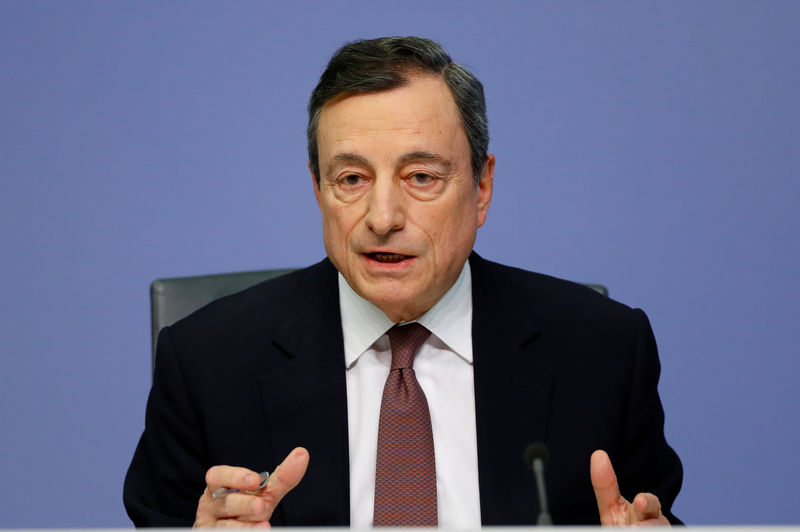By Francesco Canepa
FRANKFURT (Reuters) - The European Central Bank's fourth round of cheap long-term loans targeted at banks may steer euro zone lenders away from a cliff edge in funding.
But it is a symptom of, rather than a cure for, the bloc's economic malaise that appears to give banks little incentive to fire up a fragmented money market and risks getting some of them permanently hooked on ECB handouts.
The central bank said on Thursday it will offer banks two-year loans at a rate linked to its main interest rate, currently zero, to carry them over a funding hump that could have cost them - and the euro zone's economy - dear.
With nearly 2 trillion euro ($2.24 trillion) of excess cash sloshing around the bloc's banking system - courtesy of the ECB's own bond-buying program - one would hardly think more liquidity was needed.
The issue is that the money is predominantly stuck in richer countries such as Germany, France and the Netherlands, whose investment banks and high sovereign credit rating act as a magnet for international investors.
Meanwhile, lenders in Italy, Spain, Greece and Portugal still borrow more from the ECB than they deposit.
With some 720 billion euros ($807 billion) from the central bank's previous Targeted Long-Term Refinancing Operation (TLTRO) maturing over the next two years, it needed to move quickly to prevent a funding squeeze with added pressure from a tightening regulatory framework.
With Thursday's move to keep weaker banks on a cash drip until 2023 at least, the ECB has helped keep a disjointed euro zone in one piece.
But that fragmentation makes the cheap loans "a symptom of a bigger problem," said Shweta Singh, an economist TS Lombard.
In a relationship whose parameters were set at the start of the financial crisis in 2008, banks in core countries have little interest in lending to peripheral ones at the prevailing, negative rates.
That is especially the case once they factor in capital constraints and regulations introduced in the wake of the crisis.
Smaller Italian banks, for instance, have managed to raise very little long-term debt on the market since a fiscally expansive government took office last summer, causing borrowing costs to rise.
In this sense, the TLTROs could be viewed as a form of compensation for weaker southern countries.
Banks there get subsidized cash - and in the previous TLTRO were even paid for borrowing it if they lent it on - at a time when their northern counterparts pay a penalty charge on their excess liquidity.
"TLTROs combined with negative interest rates are a form of fiscal transfer," Singh said.
(GRAPHIC: Depositors and borrowers at the ECB - https://tmsnrt.rs/2UpDLEM)
TIERED DEPOSIT RATE?
Little surprise that some in the north are unhappy.
With the ECB's negative deposit rate going nowhere fast and the new TLTRO keeping cash overabundant, banks with excess cash are lobbying for a flatter playing field.
An option that is gaining credence among analysts is a tiered deposit rate that would enable a bank to pay a reduced charge on a portion of its excess reserves.
Various forms of the scheme have been introduced in Japan, Denmark, Sweden and Switzerland and the ECB itself considered it in 2015.
"We think the debate on tiering (in the euro zone) will intensify over the next few months," economists at BNP Paribas (PA:BNPP) wrote in a note to clients.
The reduced rate could, for example, be set at -0.20 percent - half the ECB's current deposit rate - and also serve as the "bonus" rate that banks would receive from the ECB for transferring TLTRO cash into the economy.
The move would not come without risks however.
If investors took it as an implicit rate increase, it could cause longer-term borrowing costs to rise, hobbling an already weak economy.
In addition, an overhaul of the interest rate framework would tie the ECB's hands for years to come and Bank President Mario Draghi, who steps down on Oct 31, might wish to leave such a structural change to his successor.
"It could go spectacularly wrong," a treasurer at a large euro zone bank said.
(GRAPHIC: Euro zone excess liquidity - https://tmsnrt.rs/2Cl1uiz)
